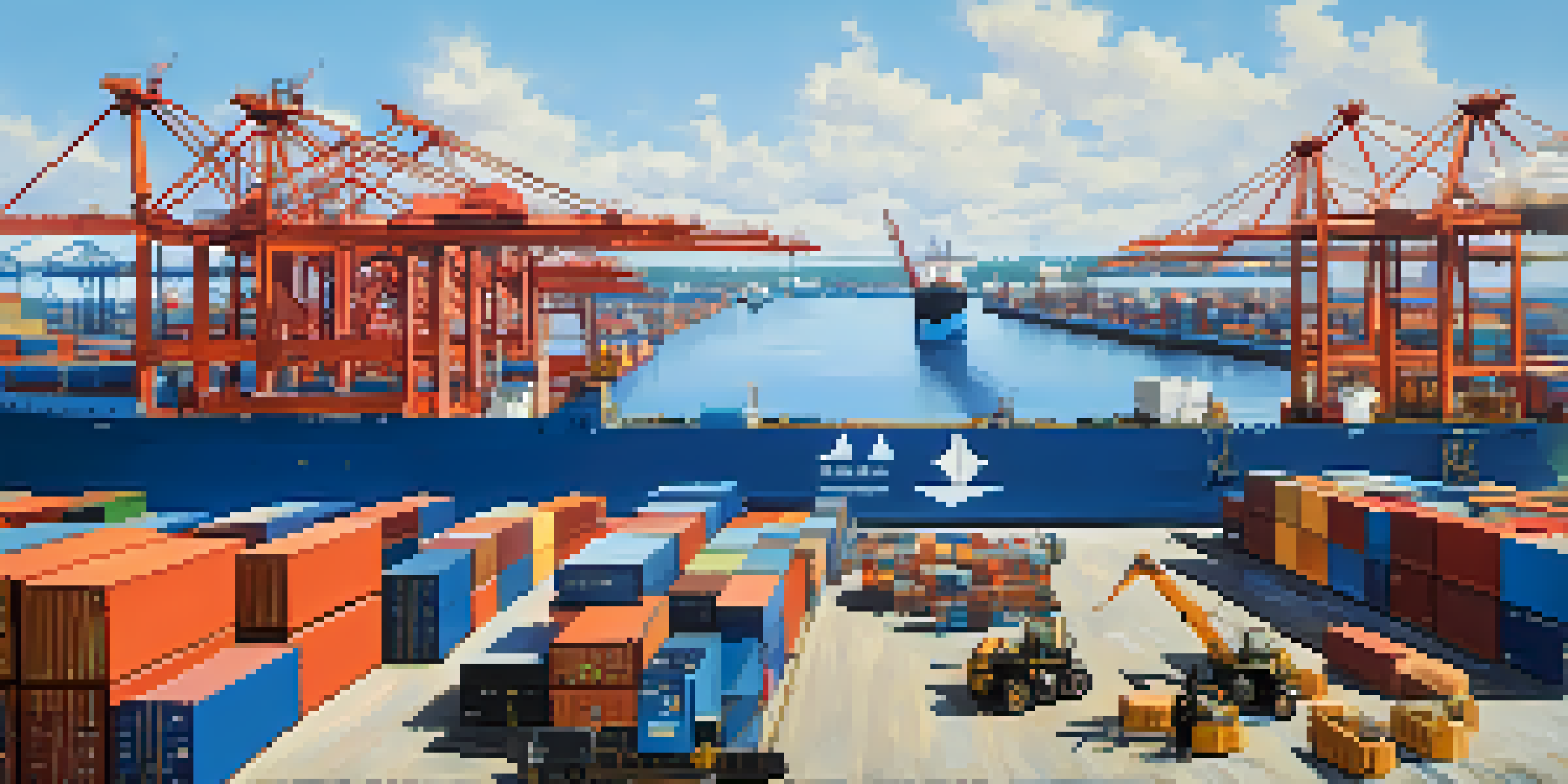The Importance of Freight Transportation in Jacksonville

Understanding Freight Transportation: A Jacksonville Essential
Freight transportation is the backbone of any thriving city, and Jacksonville is no exception. It involves the movement of goods by various means, including trucks, ships, and trains. In a bustling port city like Jacksonville, this system is crucial for connecting local businesses to global markets.
Transportation is the linchpin of the economy. It is essential for the movement of goods and services, and for the economic growth of cities.
The city's strategic location along the Atlantic coast makes it a prime hub for freight movement. With one of the largest deep-water ports in the U.S., Jacksonville facilitates the import and export of goods efficiently. This accessibility ensures that businesses can thrive by receiving materials and shipping products seamlessly.
Moreover, a well-functioning freight transportation system contributes significantly to job creation. As companies expand their reach through effective logistics, they often require more personnel, thus boosting the local economy. This interconnectedness highlights why freight transportation is integral to Jacksonville's growth.
Economic Impact: Freight Transportation Fuels Jacksonville's Growth
Freight transportation plays a pivotal role in the economic landscape of Jacksonville. It enables businesses to access a wider market, increasing sales opportunities and fostering competition. As a result, this sector supports not only large corporations but also small and medium-sized enterprises.

The economic ripple effect of efficient freight transportation is profound. For instance, when goods are delivered on time, it enhances customer satisfaction, leading to repeat business. This reliability can be a game-changer for local businesses aiming to establish a loyal customer base.
Freight Drives Jacksonville's Economy
Efficient freight transportation enhances market access for businesses, boosting local sales and economic growth.
Furthermore, the presence of a robust freight network attracts new companies to the area. When businesses see that they can efficiently transport their goods, they are more likely to set up operations in Jacksonville. This influx of businesses ultimately leads to more job opportunities and a stronger economy.
Environmental Considerations: Sustainable Freight Solutions
As Jacksonville continues to grow, the environmental impact of freight transportation becomes increasingly important. Transportation is a significant contributor to carbon emissions, prompting the need for sustainable practices. The city is exploring ways to make freight transportation more environmentally friendly.
The development of sustainable freight transportation is not just a necessity; it’s a commitment to a better future for our communities.
One approach is to encourage the use of alternative fuel vehicles for freight transport. By investing in electric or hybrid trucks, Jacksonville can reduce its carbon footprint while maintaining efficient logistics. Additionally, optimizing shipping routes can help minimize fuel consumption and emissions.
Public-private partnerships are also crucial in this transition. By collaborating with local businesses, the city can develop initiatives that promote eco-friendly transportation practices. These efforts not only benefit the environment but can also enhance the city's reputation as a forward-thinking, sustainable community.
Infrastructure Development: Building a Freight-Friendly Jacksonville
Infrastructure is the backbone of effective freight transportation in Jacksonville. The city has made significant investments in upgrading its roadways, railways, and port facilities. These enhancements ensure that goods can move quickly and efficiently, reducing transit times for businesses.
Moreover, improving infrastructure creates a safer environment for freight transport. Well-maintained roads and bridges decrease the likelihood of accidents, minimizing disruptions in the supply chain. This reliability is crucial for businesses that depend on timely deliveries to meet customer demands.
Sustainability in Freight Practices
Jacksonville is exploring eco-friendly freight solutions to reduce carbon emissions and promote a sustainable community.
The growth of infrastructure also attracts logistics companies to set up operations in Jacksonville. When businesses see a commitment to improving transportation networks, they are more likely to invest in the area. This creates a positive cycle where enhanced infrastructure leads to increased economic activity.
Challenges in Freight Transportation: Navigating the Landscape
Despite its many advantages, freight transportation in Jacksonville faces several challenges. Traffic congestion is a significant issue, particularly during peak hours, which can delay deliveries. Addressing this problem requires strategic planning and investment in alternative routes and transportation modes.
Another challenge is the ever-evolving regulatory environment. Freight companies must navigate a complex web of local, state, and federal regulations that can impact operations. Staying compliant while remaining competitive can be a tough balancing act for businesses in the transportation sector.
Additionally, labor shortages in the trucking industry pose a concern for Jacksonville's freight transportation. As demand for goods continues to rise, finding qualified drivers becomes increasingly challenging. This shortage can lead to delays and increased transportation costs, affecting the entire supply chain.
The Role of Technology: Innovations in Freight Transportation
Technology has revolutionized freight transportation, making it more efficient and reliable. In Jacksonville, companies are adopting advanced logistics software that optimizes routes and tracking systems. This technology allows businesses to monitor shipments in real-time, enhancing transparency and customer trust.
Furthermore, the use of data analytics helps companies make informed decisions about their supply chains. By analyzing trends and performance metrics, businesses can identify areas for improvement and adapt their strategies accordingly. This proactive approach can lead to cost savings and increased efficiency.
Infrastructure Supports Logistics Growth
Investments in transportation infrastructure improve freight efficiency and attract more logistics companies to Jacksonville.
Emerging technologies like autonomous vehicles and drones are also on the horizon. While still in the early stages, these innovations promise to transform the freight landscape in Jacksonville. As these technologies become more viable, they could significantly reduce transportation costs and improve service levels.
Freight Transportation and Community: Building Stronger Connections
Freight transportation is not just about moving goods; it's also about connecting communities. In Jacksonville, efficient freight systems support local businesses and improve access to essential products. This connectivity fosters a sense of community, ensuring that residents have what they need when they need it.
Moreover, active freight transportation enhances the overall quality of life in Jacksonville. When goods are readily available, it supports local markets and restaurants, contributing to the city's vibrant culture. This connection between freight and community highlights the importance of logistics in everyday life.

Additionally, engaging with the community about freight transportation helps raise awareness of its significance. By hosting events and discussions, local leaders can educate residents on how logistics impacts their daily lives. This understanding can foster support for infrastructure improvements and sustainable initiatives.